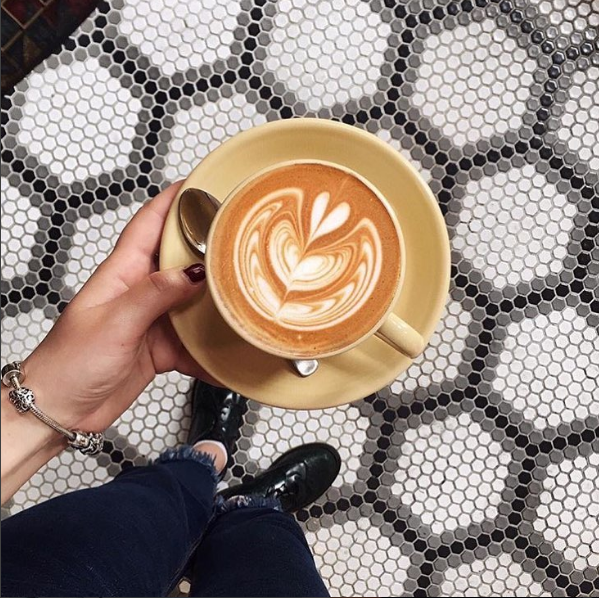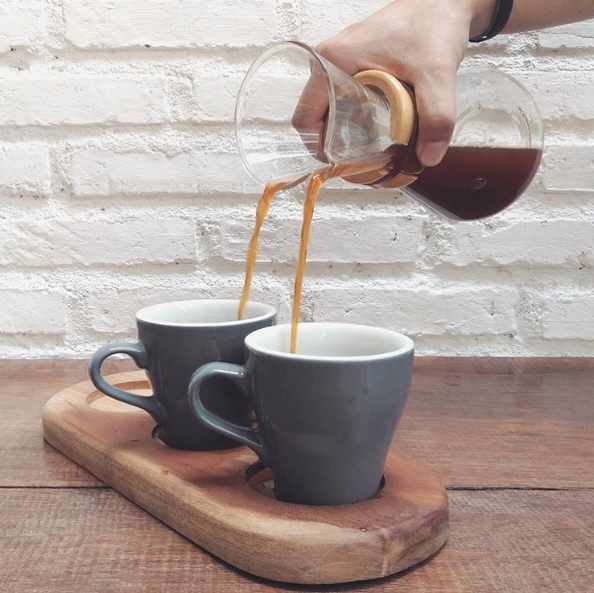How to make a cup of mellow coffee?
Follow the caf é (Wechat official account vdailycom) and found that Beautiful Cafe opened a small shop of its own.
There's a whole universe of equipment out there right now. It can be dizzying. And coffee is a complex process, with several important variables that can change the completion of what ends up in your cup.
All kinds of coffee equipment make people dizzy. And the steps of making coffee are complicated, and a variety of factors determine the taste of the finished product in your final cup.
Here are five quick and easy steps to making yourself a better cup:
Here are five simple and quick tips to help you make a better cup of coffee:

1. Grind your own beans
1. Grind your own coffee beans
When buying beans, some baristas may ask, "Would you like these ground?" Resist the temptation. And when you're at the local grocery store, ignore that large grinder in the coffee aisle. For a good cup, invest in a grinder. And for the best, make sure it's a burr grinder.
When you buy coffee beans, the barista will ask you, "do you need something that has been ground?" resist the temptation! when you go to your local grocery store, ignore the big grinder in the hallway. invest in a bean grinder for a mellow cup of coffee. and it's best to buy a plate grinder.
Basically, a burr grinder is in more of a conical shape and it ensures the beans are ground evenly (rather than grinders that have a blade that chops up the beans at random). Burr grinders can be expensive. But a hand grinder will only set you back about $35. And grinding by hand each day will build your muscles.
Basically, the disc grinder is conical, which ensures that the texture of the finished product is more uniform (far more than the random shape of the grinder blade). It may be expensive, but it only costs you $35. And grinding coffee beans every day can also help you build muscles.
2. Buy fresh beans
two。 Buy fresh coffee beans
There are a lot of variables in making a cup of coffee, and you can go wrong in any number of ways. But none are more important than the beans you buy. And acrucial factor is freshness. I've gotten more and more picky on this.
There are many factors that affect making a cup of coffee, and you can make mistakes every step of the way. But there is no more important step than choosing coffee beans. Freshness is the key, and I'm getting more and more critical about it.
You want beans several days after they've been roasted. And if it's been more than a few weeks after they were roasted, forget about it. Some places are better than others at listing this (one pet peeve: some roasters will list an expiration date rather than the date they were roasted-or when the beans were freshest).
The beans you need should have just been baked a few days ago. If it's the ones that have been baked for a few weeks, forget it. (an intolerable place: some bakers mark the expiration date rather than the baking time.)
3. Don't store them in the freezer
3. Don't put the coffee beans in the freezer.
The idea that storing beans in the freezer is a way to preserve their freshness isone of the biggest misnomers about coffee. Put those beans in a freezer, and they will start to absorb the flavors of whatever else you've got stored in there. I don't know about you, but I'm not eager to have my Sumatra mixed with flavors of chicken, ice cream, and frozen vegetables.
Keeping coffee beans in the refrigerator is one of the biggest misunderstandings about coffee. When coffee beans are put in the refrigerator, they will absorb any smell around them. I don't know what you think, but I don't want my Sumatran coffee to be mixed with chicken nuggets and frozen vegetables.
4. Step away from the machine.
Buy a French press. Or something.
4. Don't use the machine, buy a French kettle or something.
Machines are great, and they're getting even better. They can ensure consistency,there's little mess, and-crucially, for some-you can set a timer to wake up with a fresh cup. But at least for me, working with coffee manually has help edimmensely in understanding what makes a good cup.
The machine is very good, and it is becoming more and more useful. They can ensure consistency and make few mistakes, and the most important thing is that you can regularly ask them to bring you a cup of fresh coffee when you wake up. But at least for me, making a cup of coffee by hand gives me a better understanding of how to make a good cup of coffee.
There's experimentation. You have control over almost every step in the process.There are tons of ways-maybe too many ways-to make coffee. But the easiest way toget going is with a French press. They're inexpensive and easy to use.
This is an experimental process, and you can control every step of the process. There are thousands of ways to make coffee, but the simplest way is to press the pot, which is inexpensive and easy to use.
5. Get a digital scale.
5. Use an electronic scale
Yes,I realize this sounds extreme. The first time I saw someone using a scale tomake my cup of coffee-during a trip to Pavement in Boston a few years back-I thought it was completely over the top. Does brewing coffee really need to be that precise? Then I tasted the cup. And a few weeks later, I was online reading about digital scales and ordering one for my home.
Yeah, I know it sounds extreme. When I first saw someone call me coffee electronically when I was traveling in Boston a few years ago, I also thought it was an exaggeration. It's just a cup of coffee. Does it have to be that accurate? Until I tasted it, and then a few weeks later I went online and carefully read how to use the electronic balance and ordered one at home.
Most of us have regular coffee habits, so you learn how many scoops you want and how much water you need. But as I've gotten a little more discerning, I've found that the scale helps eliminate some of the room for error.
Most people have a regular habit of drinking coffee, and we know how many spoons to add and how much water to add. But I am more picky than ordinary people, so having a scale can reduce my room for making mistakes.
Original address
(www.kekenet.com/read/201501/356800.shtml)
Important Notice :
前街咖啡 FrontStreet Coffee has moved to new addredd:
FrontStreet Coffee Address: 315,Donghua East Road,GuangZhou
Tel:020 38364473
- Prev

The most common sense you need to know about coffee: good coffee is sour?
Following Ka Pai (Wechat official account vdailycom) found that Coffee Cafe opened a small shop of its own. Coffee is not only bitter, but also sour. Wow, why is this coffee so sour? In the industry, this question is as strange as asking why red wine is sour. The reason why people think that sour coffee is rotten coffee is mainly due to Starbucks' heavy baking genre and instant coffee.
- Next

Which process is the most important to make coffee?
Following Cafe (official Wechat account vdailycom) found that the process of making a good cup of coffee is the most important process for a beautiful cafe to open a small shop of its own. What is the process? The process includes a series of standard steps that we need to follow when making coffee. Does that mean that after all the steps are done, we can make good coffee? Unfortunately, the truth is not that simple. Why only
Related
- Beginners will see the "Coffee pull flower" guide!
- What is the difference between ice blog purified milk and ordinary milk coffee?
- Why is the Philippines the largest producer of crops in Liberia?
- For coffee extraction, should the fine powder be retained?
- How does extracted espresso fill pressed powder? How much strength does it take to press the powder?
- How to make jasmine cold extract coffee? Is the jasmine + latte good?
- Will this little toy really make the coffee taste better? How does Lily Drip affect coffee extraction?
- Will the action of slapping the filter cup also affect coffee extraction?
- What's the difference between powder-to-water ratio and powder-to-liquid ratio?
- What is the Ethiopian local species? What does it have to do with Heirloom native species?

